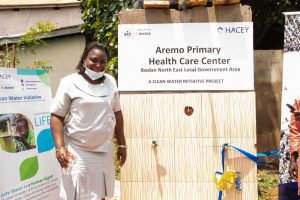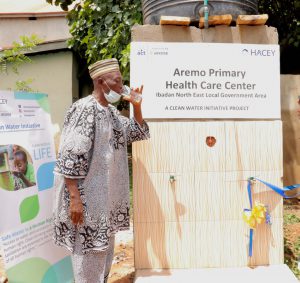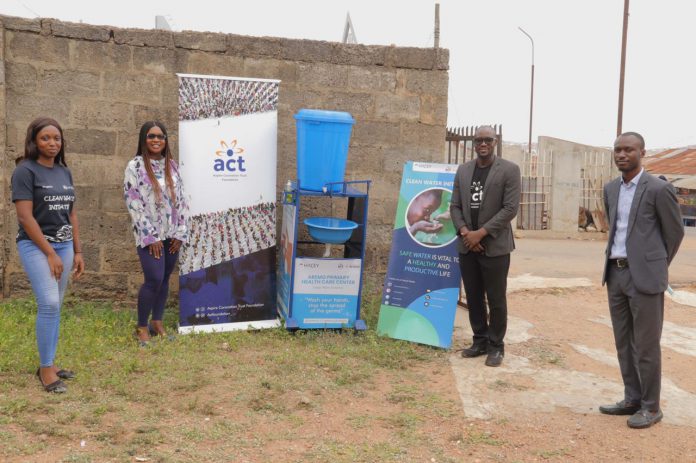In an attempt to boost access to safe water, adequate sanitation facilities and hygienic promotion, the HACEY Health initiative has organized a Clean Water Initiative (CWI) workshop for healthcare workers in Oyo state.
The workshop, which involved medical persons from selected primary health care centres and public primary schools across 5 local governments, was funded by Aspire Coronation Trust (ACT) Foundation.
Benefiting local government areas are Ibadan South West, Ibadan North West, Ibadan North East, Lagelu and Egbeda Local Government Areas.
Since its first launch in 2015, the Clean Water Initiative (CWI) has improved access to potable water in rural and underserved communities, particularly in the southwest.
The initiative has provided boreholes and training on safe water, adequate sanitation facilities and hygiene promotion (WASH) to over 150,000 people in 52 communities across South-western Nigeria.
HACEY’s CWI project aims to increase the availability of basic WASH information and services in 7 primary health centres and 6 public schools in Oyo and Delta State through the installation of electricity powered boreholes and handwashing stations and capacity building sessions on safe water and proper sanitation and hygiene practices.
Rhoda Robinson, the executive director of HACEY Health, bemoaned the deplorable condition of the health sector in Nigeria, stating that hygiene promotion is key to infectious disease control.

“Globally, nearly 40% of health facilities lack water supplies, 19% do not have improved sanitation and 35% do not have any hand hygiene materials while in Nigeria, 29% of health care facilities do not have access to safe water and toilets and 16% do not have handwashing facilities with soap (WHO, UNICEF, 2015).”
“In 2016, nearly 570 million children worldwide (31%) lacked basic drinking water service at their school and among them, over 340 million children (19%) had no drinking water service at their school.”
“In Nigeria, only 50% of primary schools had limited access to drinking water, sanitation and hygiene, with the remaining 50% having no access at all (WHO/UNICEF JMP, 2018). These compromise the ability of the health facilities to provide basic routine as well as prevent and control infection.”
“WASH in PHCs and schools is required to ensure the achievement of the Sustainable Development Goals 3 (ensure healthy lives and promote well-being) and 6 (ensure availability and sustainable management of water and sanitation).”
“Access to safe water, hygiene and sanitation facilities plays a vital role in preventing the spread of the COVID-19 pandemic. Preventing its spread from person to person is vital to reduce the pandemic’s impact on people’s lives, health, livelihoods and the healthcare systems we all rely on.”
Speaking with this reporter during the workshop, Mrs Chioma Obi -the project lead- emphasized the importance of hygienic water and sanitation.
She said, “Access to safe water, adequate sanitation facilities, and hygiene promotion (WASH) is a basic human right that plays an integral role in improving the population’s health and productivity.”
“Limited access to basic WASH services puts vulnerable populations at risk of water-borne illnesses, maternal and neonatal mortality, and school absenteeism and/or dropout. Pregnant women and new-born are especially vulnerable to the consequences of poor WASH services”

Mrs Chioma called for a stronger collaboration between healthcare workers, education sectors and community members in establishing systems and structures to ensure that the water facility is protected and to ensure community members consistently practice proper water, sanitation, and hygiene behaviors.
“A child’s right to quality education also includes them having access to safe drinking water, hygiene information, basic sanitation and hygiene services while in school, which can greatly improve their health and productivity outcomes, especially for girls.
“However, to be successful, hygiene promotion must be accompanied by efforts to build trust and mutual understanding, engaging communities in communications and decision-making.
“Towards supporting the effort of school administrators, teachers, school nurses and school health assistants in providing students with comprehensive and age-appropriate information on safe water and proper sanitation and hygiene practices, a WASH training manual was developed. The manual serves as a practical guide for teachers when conducting hygiene promotion activities in schools.”
“At the end of the training, participants were encouraged to pass down knowledge gained from the training to students, patients and other staff members. PHC workers were also encouraged to include WASH teachings as part of their pre-and post-natal education for pregnant women and nursing mothers.”
By Phillip Anjorin








